专业四级考试听力技巧(dictation部分)
- 格式:ppt
- 大小:99.52 KB
- 文档页数:6
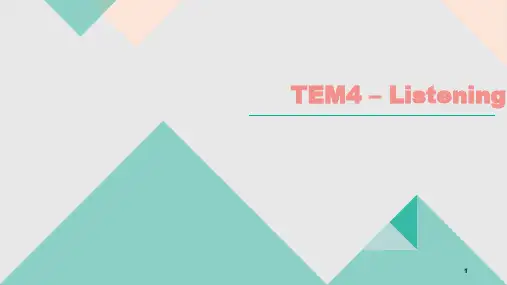
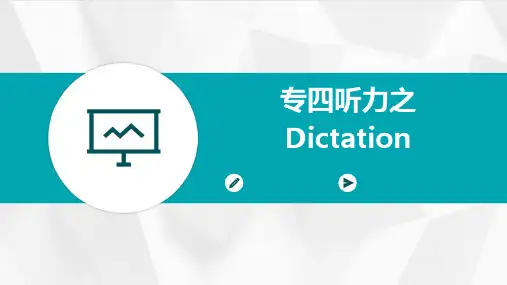
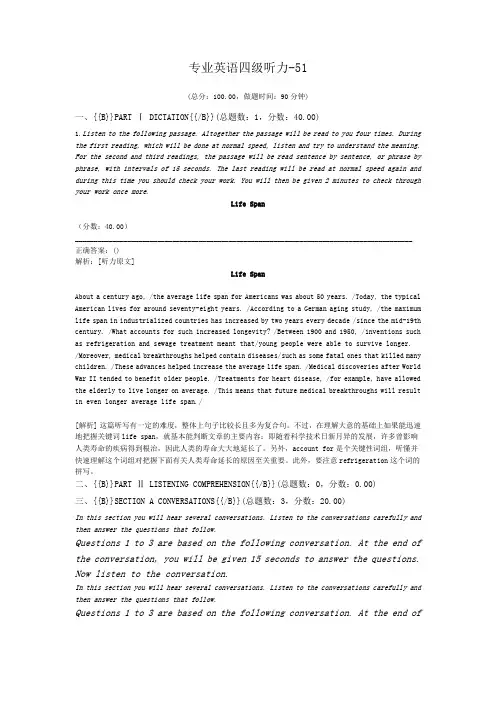
专业英语四级听力-51(总分:100.00,做题时间:90分钟)一、{{B}}PART Ⅰ DICTATION{{/B}}(总题数:1,分数:40.00)1.Listen to the following passage. Altogether the passage will be read to you four times. During the first reading, which will be done at normal speed, listen and try to understand the meaning. For the second and third readings, the passage will be read sentence by sentence, or phrase by phrase, with intervals of 15 seconds. The last reading will be read at normal speed again and during this time you should check your work. You will then be given 2 minutes to check through your work once more.Life Span(分数:40.00)__________________________________________________________________________________________正确答案:()解析:[听力原文]Life SpanAbout a century ago, /the average life span for Americans was about 50 years. /Today, the typical American lives for around seventy-eight years. /According to a German aging study, /the maximum life span in industrialized countries has increased by two years every decade /since the mid-19th century. /What accounts for such increased longevity? /Between 1900 and 1950, /inventions such as refrigeration and sewage treatment meant that/young people were able to survive longer./Moreover, medical breakthroughs helped contain diseases/such as some fatal ones that killed many children. /These advances helped increase the average life span. /Medical discoveries after World War II tended to benefit older people. /Treatments for heart disease, /for example, have allowed the elderly to live longer on average. /This means that future medical breakthroughs will result in even longer average life span./[解析] 这篇听写有一定的难度,整体上句子比较长且多为复合句。

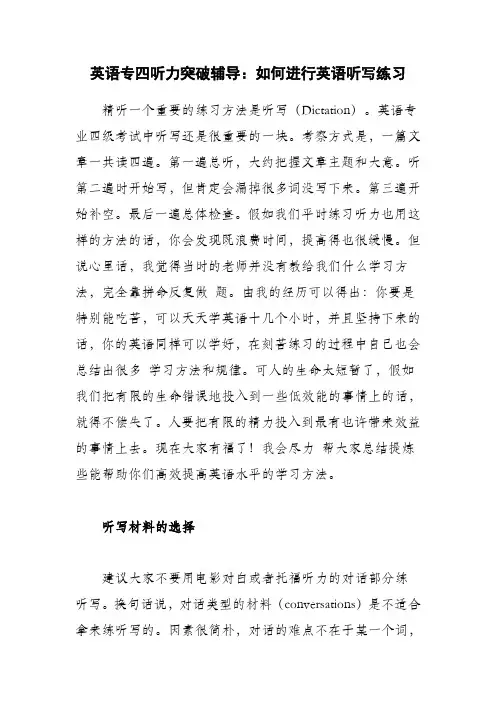
英语专四听力突破辅导:如何进行英语听写练习精听一个重要的练习方法是听写(Dictation)。
英语专业四级考试中听写还是很重要的一块。
考察方式是,一篇文章一共读四遍。
第一遍总听,大约把握文章主题和大意。
听第二遍时开始写,但肯定会漏掉很多词没写下来。
第三遍开始补空。
最后一遍总体检查。
假如我们平时练习听力也用这样的方法的话,你会发现既浪费时间,提高得也很缓慢。
但说心里话,我觉得当时的老师并没有教给我们什么学习方法,完全靠拼命反复做题。
由我的经历可以得出:你要是特别能吃苦,可以天天学英语十几个小时,并且坚持下来的话,你的英语同样可以学好,在刻苦练习的过程中自己也会总结出很多学习方法和规律。
可人的生命太短暂了,假如我们把有限的生命错误地投入到一些低效能的事情上的话,就得不偿失了。
人要把有限的精力投入到最有也许带来效益的事情上去。
现在大家有福了!我会尽力帮大家总结提炼些能帮助你们高效提高英语水平的学习方法。
听写材料的选择建议大家不要用电影对白或者托福听力的对话部分练听写。
换句话说,对话类型的材料(conversations)是不适合拿来练听写的。
因素很简朴,对话的难点不在于某一个词,或一个复杂的句型,或比较晦涩的内容,或巨大的信息量。
难点往往来自于一些音变现象,比如连读失去爆破;来自于一些俚语习惯表达;来自于上下文语境的理解。
换句话说,很多对话材料,就算原文里每个单词你都结识,但不一定理解这句话的意思。
所以,费了半天劲听写下来的对话内容,要么看不懂不理解;要么就是这次看懂了,下次还是听不出。
所以,对话材料应当采用的练习方法其实是跟读模仿。
后面会讲到。
用来练听写的材料应当是一个人的陈述、讲座之类的(Lecture)。
之所以选择这样的材料,是和练听写的目地分不开的。
练听写的核心本质其实是为了提高我们快速理解和记忆的能力。
有的同学误认为听写就是要把听到的所有内容都写下来,那是一些考试的规定,不是我们平时提高听力的方法。
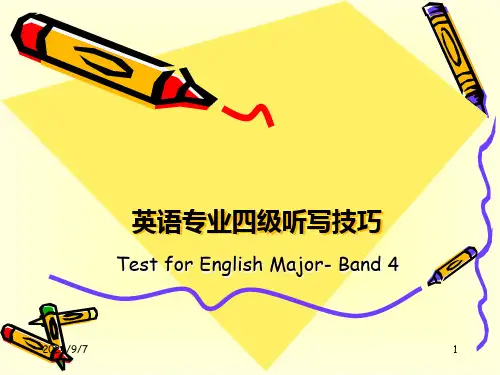
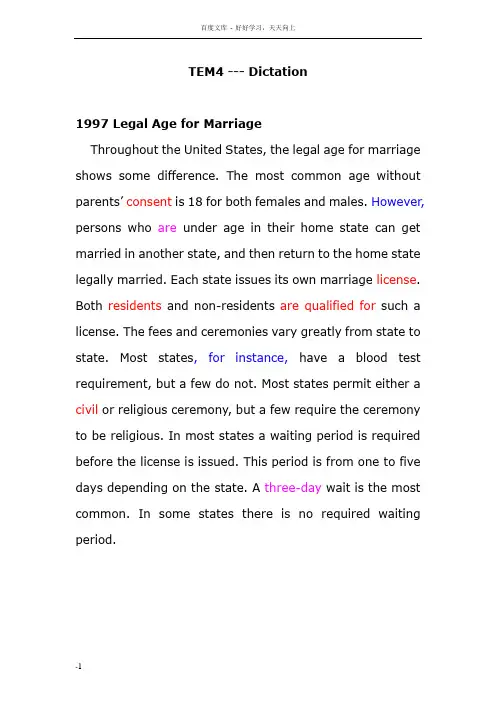
TEM4 --- Dictation1997 Legal Age for MarriageThroughout the United States, the legal age for marriage shows some difference. The most common age without parent s’consent is 18 for both females and males. However, persons who are under age in their home state can get married in another state, and then return to the home state legally married. Each state issues its own marriage license. Both residents and non-residents are qualified for such a license. The fees and ceremonies vary greatly from state to state. Most states, for instance,have a blood test requirement, but a few do not. Most states permit either a civil or religious ceremony, but a few require the ceremony to be religious. In most states a waiting period is required before the license is issued. This period is from one to five days depending on the state. A three-day wait is the most common. In some states there is no required waiting period.1998 The Railway in BritainThe success of early railways, such as the lines between big cities, led to a great increase in railway building in Victorian Times. Between 1835 and 1865 about 25,000 kilometers of track was built, and over 199 railway companies were created. Railway travel transform ed people's life. Trains were first designed to carry goods. However, a law in the 19th century forced railway companies to run one cheap train a day, which stopped at every station and cost only a penny a mile. Soon working-class passengers found they could afford to travel by rail. Cheap-day-excursion trains became popular,and seaside resorts grew rapidly. The railways also provided thousands of new jobs: building carriage s, running the railways and repairing the tracks. Railways even changed the time. The need to run the railways on time meant that local time was abolish ed, and clocks showed the same timeall over the country.1999 United Nations’ DayThe 24th. of October is celebrated as United Nations’Day. It is the day that belongs to everyone, and it is celebrated in most countries of the world. Some countries celebrate for a week instead of a day. In many parts of the world, schools have special programs for the day. Boys and girls in some communities decorate a UN tree. In other communities, young people put on plays about the UN. Some libraries exhibit children’s art works from around the world. Schools celebrate with the songs and dances of other countries, or give parties where foods of other countries are served. No matter how the day is celebrated, the purpose ofthese celebrations is to help everyone understand the UN and the important roles it plays in world affairs. The UN encourages people to learn about other lands and their customs. In this way, people can gain a better understanding and appreciation of peoples all over the world.2000 What We Know about LanguageMany things about language are all mystery and will remain so. However, we now do know something about it. First, we know that all human beings have a language of some sort. No human race anywhere on earth is so backward that it has no language of its own at all. Second, there is no such thing as a primitive language. There aremany peoples whose cultures are undeveloped, but the languages they speak are by no means primitive. In all the languages existing in the world today, there are complexities that must have been developed for years. Third, we know that all languages are perfectly adequate. Each is a perfect means of expressing its culture. And finally, we know that a language changes over time, which is natural and normal if a language is to survive. The language which remains unchanged is nothing but dead.2001 Characteristics of a Good ReaderTo improve your reading habits, you must understandthe characteristics of a good reader. First, the good reader usually reads rapidly. Of course he does not read every piece of material at the same rate. But whether he is reading a newspaper or a chapter in a physics text, his reading rate is relatively fast. He has learnt to read for ideas rather than words one at a time. Next, the good reader can recognize and understand general ideas and specific details. Thus he is able to comprehend the material with a minimum of effort and a maximum of interest. Finally, the good reader has at his command several special skills which he can apply to reading problems as they occur. For the college student, the most helpful of these skills include making use of the various aids to understanding that most text books provide and skim reading for a general survey.2002 Disappearing ForestsThe world’s forests are disappearing. As much as 1/3 of the total tree cover has been lost since agriculture began some 10,000 years ago. The remaining forests are home to half of the world species, thus becoming the chief resource for their survival. Tropical rainforests once covered 12% of the land of the planet. As well as supporting at least half of the world’s species of plants and animals, these rainforests are homes to millions of people. But there are other demands on them. For example, much has been cut for timber. An increasing amount of forestland has been used for industrial purposes or for agriculture development such as crop growing. By the 1990’s less than half of the earth original rainforests remained, and they continued to disappear at the alarming rate every year. As a result, the world’s forests are now facing gradual extinction.2003 SalmonEvery year millions of salmon swim from the ocean into the mouth of rivers and then steadily up the rivers. Passing through waters, around rocks and waterfalls, the fish finally reach their original streams or lakes. They dig out nests in the riverbed and lay their eggs. Then, exhausted by their journey, the parent salmon die. They have finished the task that nature has given them. Months or years later, the young fish start their trip to the ocean. They live in the salt water from two to seven years until they too are ready to swim back to reproduce. Their life cycle helps man provide himself with a basic food --- fish. When the adult salmon gather at the river mouths for the annual trip up the rivers, they are in the best possible condition, and nearly every harbor has its salmon fishing fleet ready to catch thousands for markets.2004 MoneyMoney is accepted across the world as payment for goods or services. People use money to buy food, clothes and hundreds of other things. In the past, many different things were used as money. People on Pacific islands once exchanged shells for goods. The Chinese used cloth and knives. In Africa, elephant’s tusks or salt were used. Even today some people in Africa are still paid in salt. Coins were first invented by the Chinese. Originally they were round pieces of metal with a hole in the center, so the piece of string could keep them together. This made doing businessmuch easier. But people still found coins inconvenient to carry when they wanted to buy something expensive. T o solve this problem, the Chinese again came up with a solution. They began to use paper money for coins. Now paper notes are used throughout the world.2005 The Wrist WatchIt is generally believed that wrist watches are an exception to the normal sequence in the evolution of man's jewelry. Reversing the usual order, they were first worn by women and then adopted by men. In the old days, queens included wrist watches among their crown jewelry. Later, they were worn by Swiss workers and farmers. Until WorldWar I, Americans associated the watch with fortune hunters. Then army officers discovered that the wrist watch was most practical for active combat. Race car drivers also loved to wear wrist watches, and pilots found them most useful while flying. Soon men dared to wear wrist watches without feeling self-conscious. By 1924, some 30 percent of man's watches were worn on the wrist. Today, the figure is 90 percent. And they are now worn by both men and women for practical purposes rather than for decoration.2006 The InternetThe Internet is the most significant progress in the field of communications. Imagine a book that never ends, alibrary with a million floors, or imagine a research project with thousands of scientists working around the clock forever. This is the magic of the internet. Yet the Internet has the potential for good and bad. One can find well-organized, information-rich websites. At the same time, one can also find wasteful websites. Most websites are known as different Internet applications. These include online games, chat rooms and so on. These applications have great power, too. Sometimes, the power can be so great that young people may easily become victims to their attraction. So we need to recognize the seriousness of the problem. We must work together to use its power for better ends.2007 AdvertisingAdvertising has already become a specialized activity in modern times. In today’s business world, supply is usually greater than demand. There is great competition between manufacturers of the same kind of product because they want to persuade customers to buy their particular brand. They always have to remind their customers of the name and qualities of their products by advertising. The manufacturer advertises in newspapers and on the radio. He sometimes employs sales girls to distribute samples of his product. He sometimes advertises on the Internet as well. In addition, he always has advertisements put into television programs that will accept them. Manufacturers often spend huge sums of money on advertisements. We buy a particular product because we think that is the best. We usually think so because the advertisements say so. People often don’t ask themselves if th e advertisements are telling the truth when they buy advertised products from shops.2008 Choosing a CareerWhen students graduate from college, many of them do not know how they want to spend their working lives, and they sometimes move from job to job until they find something that suits them and of equally importance to which they are suited. Others never find a job in which they are really happy. They remain all their lives square pegs in round holes(不得其所的人). When we choose our careers, we need to ask ourselves two questions: First, what do we think we would like to be? Second, what kind of people are we? The idea, for example, of being a painter or a musician may seem very attractive, but unless we have great talent and are willing to work very hard, we are certain to fail in these occupations and failure will lead to unhappiness in life.So it is important to assess our suitability for a certain career in job search.2009 New Year's EveFor many people in the west, New Year’s Eve is the biggest party of the year. It’s time to get together with friends or family and welcome in the coming year. New Year’s parties can take place in different places. Some people hold a house party; others attend street parties, while some just go for a few drinks with their friends. Big cities have large and spectacular fireworks displays. There is one thing that all New Year’s Eve parties have in common:the countdown to midnight. When the clock strikes 12, people give a loud c heer and sing songs. It’s also popular to make a promise in the New Year. This is called a New Year’s resolution. Typical resolutions include giving up smoking and keeping fit. However, the promise is often broken quite quickly and people are back into their bad habits within weeks or days.For lots of people in Britain, the 31st of December, or New Year's Eve as we call it, is the biggest party of the year. It's a time to get together with friends or family and welcome in the coming year. New Year's parties can take place at a number of different venues. Some people hold a house party; others attend street parties, while some just go to their local for a few drinks with their mates. Big cities, like London, have large and fireworks displays. There's one thing that all New Year's Eve parties have in common: the countdown to midnight. When the clock strikes twelve, revelers give a loud cheer, pop champagne corks and give each other a kiss. They then link arms and sing a songcalled Auld Lang's Syne, by a Scottish poet called Robert Burns. Not many people can remember all the lyrics, but the tune is well known, so lots of people just hum along. The parties then continue into the early hours of the morning with lots of dancing and drinking. Because of this, for a lot of people New Year's Day starts with a hangover. Other people might spend the day visiting relatives or friends they haven't managed to catch up with for a while. Whatever happens, New Year's Day tends to be very relaxed. In Britain, it's popular to make a promise to yourself about something you are going to do, or want to stop doing, in the New Year. This is called a New Year's . Typical s include giving up smoking and joining a gym to get fit. However, the promise is often broken quite quickly and people are back into their bad habits within weeks or days. New Year's Day is the last bank holiday of the festive season, which means most people have to go to work the next day: bright and fresh and ready for the new year ahead!。
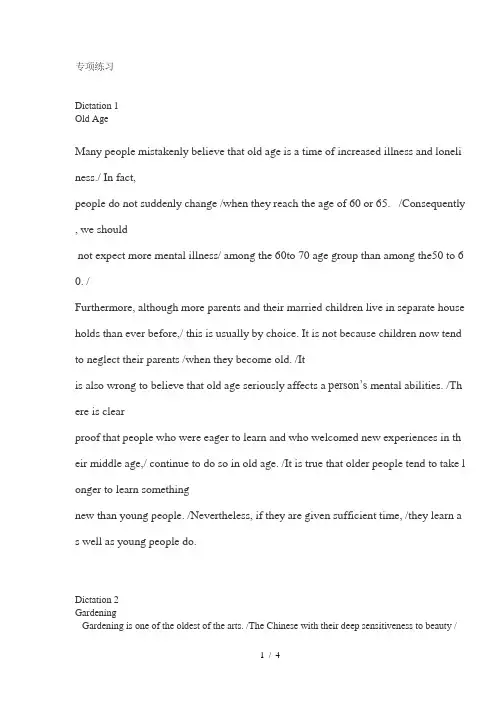
专项练习Dictation 1Old AgeMany people mistakenly believe that old age is a time of increased illness and loneli ness./ In fact,people do not suddenly change /when they reach the age of 60 or 65. /Consequently , we shouldnot expect more mental illness/ among the 60to 70 age group than among the50 to 6 0. /Furthermore, although more parents and their married children live in separate house holds than ever before,/ this is usually by choice. It is not because children now tend to neglect their parents /when they become old. /Itis also wrong to believe that old age seriously affects a person’s mental abilities. /Th ere is clearproof that people who were eager to learn and who welcomed new experiences in th eir middle age,/ continue to do so in old age. /It is true that older people tend to take l onger to learn somethingnew than young people. /Nevertheless, if they are given sufficient time, /they learn a s well as young people do.Dictation 2GardeningGardening is one of the oldest of the arts. /The Chinese with their deep sensitiveness to beauty /laid the foundation for a form of garden art /which was later to have great influences upon other lan ds. /The Greeks gave to the world a new concept of gardening. /Their homes were decorated with flowers/but it was in their civic design that they most skillfully applied their garden art. /Their temp les were surrounded by rows oftrees, /and trees lined the important streets and market places in thei r principal cities. /TheRomans acquired much of the knowledge and skill in garden craft from Gree ks. /In the second century AD the Romans began to build gardens of great scale, /inspired by the va st palace gardens they had conquered./ They bought water from great distances to supply the orna mental foundations which decorated their villa gardens./ these great villas were later to inspire the Italian garden architects to follow the Roman style.Dictation 3Being UnemployedMost people are much more frightened by being unemployed than they need to be. /Being unempl oyed certainly has disadvantages,/ but there are good things about it too. /One advantage is that you don’t have to get up early to work in the rush hour. /You can stay in bed as long as you like, /and there is plenty of time to read the newspaper /and have a leisurely breakfast./ But the best thing of a ll is that you are your own boss /and there is no one to tell you what to do and when to do it. /One drawback of being unemployed is that you haven’t got much money coming in. /Having a job at le ast enables you to save a lot of money to go on holiday./ On the other hand, when you are unemplo yed, /you needn’t go on holiday /because you are on holiday already. /In fact, the main trouble is th at you have to spend much time looking for a job./Dictation 4The Credit Card in the U.S.Today, more and more people in the U.S. are using credit card/instead of money to buy what they need./Almost anyone who has a steady income and a continuous work record/can apply for a credit card. With a credit card, you can buy a car, eat a dinner, take a trip/ and even get a haircut by charging the cost to your account./ In this way, you can pay for purchases a month or two later./ Or you may choose to spread out your payments over severalmonths/ and pay only part of the total amount each month./With a credit card,you don’t have to carry much cash/ and you don’t have to be concerned about losing your money through carelessness or theft./ The card user only has to worry about paying the final bill./ This of course can be a problem/ if you charge more than you can pay for.Dictation 5A Woman at HomeIn Japan, most people still feel that a woman’s right place is in the home /and most women willingly accept their traditional role as wives, /leaving the business of making a living to their husbands. / For those who do want a career of their own, opportunities are limited. /And working women usual ly have to settle for lower wages and less responsible positions. /In America, on the other hand, m ost women, including wives and mothers, work most of their lives. /But until recently, few have ha d real careers. /As in Japan, most fields are dominated by men /and opportunities for women have been restricted, /salaries low, chances for promotion rare. /American women work mainly because they have to./ In these days of inflation and expensive living, /only one income per family is simpl y not enough. /So American women actually have two jobs: /one outside the home, and the other ro und-the-clock job such as wife, cook and nurse.Dictation 6SuccessSuccess in life depends to a great extent on what is meant by success. /To some peop le, money is the only real indication /of achievement in the modern world and theref ore/ their judgment of success is based on the state/ of their bank balance and the po wer that goes with it. /Their life is devoted to making money/ and they are at a loss t o understand people whose ideas are different from their own./ There are people, ho wever, who consider their lives successful/ if they are doing what they enjoy doing/ t hat may not bring them any great financial reward./A man who spends his time gardening might consider himself successful/ if the flowers blossomed and his trees gave fruit. /Nursing and teaching can also bring their own ki nd of successto those engaged in them. /Success can be found in painting a picture nobody will ev er see. /Thegreat thing is to believe that success is not necessarily public.Dictation 7People’s Way of Seeing ThingsThe way we see things is affected by what we know or what we believe. /For those people who bel ieved in the physical existence of Hell in the Middle Ages, /the sight of fire must have meant somet hing quite different from what it means today. /Nevertheless, their idea of Hell owed a lot to the sig ht/ of fire consuming and the ashes remaining as well as to their experience of the pain of burns. / We only see what we look at. /To look is an act of choice. /As a result of this act, what we see is br ought within our reach,/ though not necessarily within arm’s reach. /To touch something is to situat e oneself in relation to it./ We never look at just one thing. /We are always looking at the relation b etween things and ourselves. /Our vision is continually active, continually moving, /continually hol ding things in a circle around itself.Dictation 8EducationSome people may say that it is energy that makes the world go round, /but in my opinion thereis something else which is equally important. /That is education. /Education makes it possible to pa ss on /the invaluable knowledge of our ancestors and, at the same time, /makes it easier to explore the contemporary world. /Most great inventions have been brought about by educated people. /So we can say that education makes the world go round. /A poorly educated nation can never be a rich one. /The most advanced countries in the world all place great emphasis on education. /Nations w hich have a low percentage of educated people can, /in most cases, barely produce the basic necessi ties of life,/ let alone develop their science, technology and economics. /Such nations are facing the possibility of extinction in this highly developed world. /Therefore, education cannot be emphasiz ed enough in a developing country.。
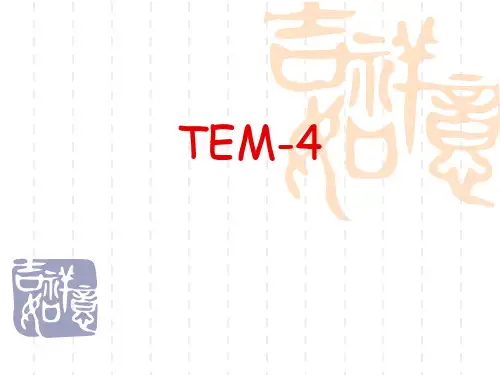
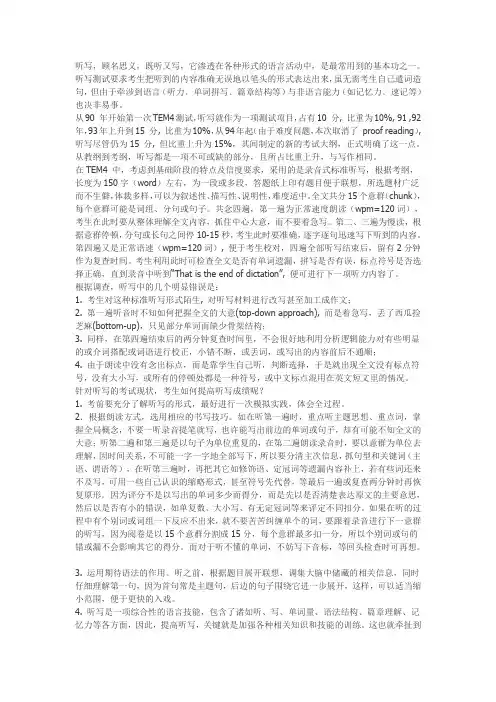
听写,顾名思义,既听又写,它渗透在各种形式的语言活动中,是最常用到的基本功之一。
听写测试要求考生把听到的内容准确无误地以笔头的形式表达出来,虽无需考生自己遣词造句,但由于牵涉到语言(听力﹑单词拼写﹑篇章结构等)与非语言能力(如记忆力﹑速记等)也决非易事。
从90 年开始第一次TEM4测试,听写就作为一项测试项目,占有10 分, 比重为10%, 91 ,92年,93年上升到15 分, 比重为10%,从94年起(由于难度问题,本次取消了proof reading), 听写尽管仍为15 分, 但比重上升为15%,其间制定的新的考试大纲,正式明确了这一点。
从教纲到考纲,听写都是一项不可或缺的部分,且所占比重上升,与写作相同。
在TEM4 中,考虑到基础阶段的特点及信度要求,采用的是录音式标准听写,根据考纲,长度为150字(word)左右,为一段或多段,答题纸上印有题目便于联想,所选题材广泛而不生僻,体裁多样,可以为叙述性、描写性、说明性,难度适中。
全文共分15个意群(chunk),每个意群可能是词组、分句或句子。
共念四遍,第一遍为正常速度朗读(wpm=120词),考生在此时要从整体理解全文内容,抓住中心大意,而不要着急写。
第二、三遍为慢读,根据意群停顿,分句或长句之间停10-15秒,考生此时要准确,逐字逐句迅速写下听到的内容。
第四遍又是正常语速(wpm=120词), 便于考生校对,四遍全部听写结束后,留有2分钟作为复查时间。
考生利用此时可检查全文是否有单词遗漏,拼写是否有误,标点符号是否选择正确,直到录音中听到“That is the end of dictation”, 便可进行下一项听力内容了。
根据调查,听写中的几个明显错误是:1. 考生对这种标准听写形式陌生, 对听写材料进行改写甚至加工成作文;2. 第一遍听音时不知如何把握全文的大意(top-down approach), 而是着急写,丢了西瓜捡芝麻(bottom-up),只见部分单词而缺少骨架结构;3. 同样,在第四遍结束后的两分钟复查时间里,不会很好地利用分析逻辑能力对有些明显的或介词搭配或词语进行校正,小错不断,或丢词,或写出的内容前后不通顺;4. 由于朗读中没有念出标点,而是靠学生自己听,判断选择,于是就出现全文没有标点符号,没有大小写,或所有的停顿处都是一种符号,或中文标点混用在英文短文里的情况。
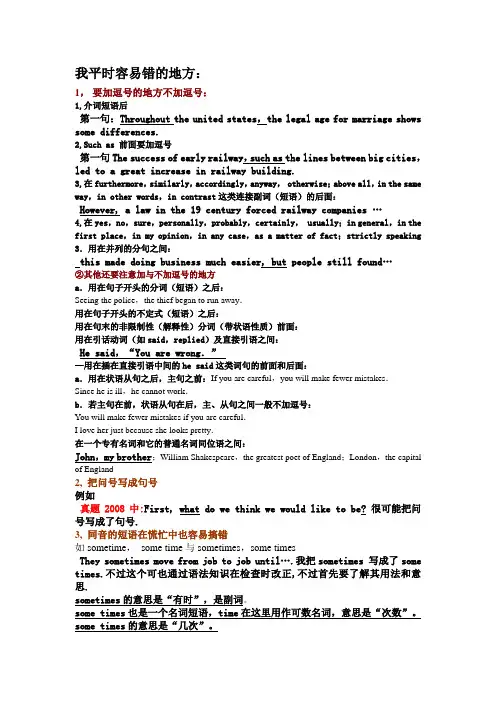
我平时容易错的地方:1,要加逗号的地方不加逗号:1,介词短语后第一句:Throughout the united states,the legal age for marriage shows some differences.2,Such as 前面要加逗号第一句The success of early railway,such as the lines between big cities,led to a great increase in railway building.3,在furthermore,similarly,accordingly,anyway, otherwise;above all,in the same way,in other words,in contrast这类连接副词(短语)的后面:However, a law in the 19 century forced railway companies …4,在yes,no,sure,personally,probably,certainly, usually;in general,in the first place,in my opinion,in any case,as a matter of fact;strictly speaking 3.用在并列的分句之间:this made doing business much easier, but people still found…②其他还要注意加与不加逗号的地方a.用在句子开头的分词(短语)之后:Seeing the police,the thief began to run away.用在句子开头的不定式(短语)之后:用在句末的非限制性(解释性)分词(带状语性质)前面:用在引话动词(如said,replied)及直接引语之间:He said,“You are wrong.”—用在插在直接引语中间的he said这类词句的前面和后面:a.用在状语从句之后,主句之前:If you are careful,you will make fewer mistakes.Since he is ill,he cannot work.b.若主句在前,状语从句在后,主、从句之间一般不加逗号:You will make fewer mistakes if you are careful.I love her just because she looks pretty.在一个专有名词和它的普通名词同位语之间:John,my brother;William Shakespeare,the greatest poet of England;London,the capital of England2, 把问号写成句号例如真题2008中:First, what do we think we would like to be? 很可能把问号写成了句号.3, 同音的短语在慌忙中也容易搞错如sometime,some time与sometimes,some timesT hey sometimes move from job to job until….我把sometimes 写成了some times.不过这个可也通过语法知识在检查时改正,不过首先要了解其用法和意思.sometimes的意思是“有时”,是副词。
决战专业英语四级听力(1)如何决战专业四级听力全国高等学校专业四级考试听力部分的测型分为两个主要部分:Dictation和Listening Comprehension。
第一部分Dictation为1篇约150个词的短文,全篇文章共念4遍。
第一遍用正常速度,每分钟120个词,让学生听懂短文的大意。
第二、三遍则用较慢的语速朗读。
句子或分句间留有1 0~15秒左右的间隙,特别长的句子有意群停顿,让书写。
第四遍再用正常速度朗读,在这期间,考生对自己所记录的内容根据录音核实、检查。
这一部分的时间是15分钟。
第二部分是Listening Comprehension。
它由三个部分组成,即Section A、Section B 以及Section C,共有25道选择题。
各部分的题型分别为:Section A: Statement,共8题;Section B:Conversation,共9题;Section C:News Broadcast,在4篇左右的VOA或BBC听力材料之后,考生需就每篇材料分别完成1~3道书面选择题,共8题。
每一道选择题后留给考生10秒的间隙,考生必须利用这一间隙选出答案,录音的语速为每分钟120~150个词,只读1遍。
整个听力理解部分的测试时间为20分钟。
二、专业四级听力测试要点及基本应试对策(一)听写1.听写的测试要点听写所涉及的知识大致可分为语言因素和非语言因素两大类。
语言因素主要指语言知识,即语言基本功中包括诸如语言知识、词汇知识、句法知识和语用知识等。
现分述如下:1)语言知识。
包括对每一个音的发音部位和发音方法,对元音和辅音的语音特征及区别,对音节结构和同化的规则,对省音和加音的现象,以及对语调和重音规则等知识的了解和掌握。
2)词汇知识。
包括对词汇的分类、构词规则,以及习语、短语的了解和掌握。
3)句法与语义知识。
包括对句子结构,句型转换规则,语义特征如歧义、反义等知识的了解和掌握。
[英语专四听力理解提分技巧]英语专四听力dictation英语专四听力理解提分技巧英语专四听力理解提分技巧在英语专业四级考试的诸多题型中,听写题型是考察教学大纲执行情况和考生掌握语言综合情况的重要检测手段,同时也是考生失分较为严重的题型之一。
结合考试真题深入分析解题误区并积极探讨高效解题策略,既能帮助考生把握该题型的肯綮,也有利于夯实英语专业基本技能训练的基础。
英语专四听力理解提分技巧第一,要克服心理障碍。
心理因素对人的现场发挥有很大的影响,特别在听力考试中,由于考场的紧张气氛,加之录音只放一遍,不能复听,常使考生产生畏惧心理。
考生在听之前,生怕听不懂,听觉紧张,越紧张就越不能专心;还有的考生遇到未听懂或未完全听懂的题就不知所措,或有个别词汇一下子听不出而绞尽脑汁地想,影响对接下来内容的注意力。
对此,考生首先要安定好自身情绪,集中精力,轻松愉快地做好听力测试前的一切准备,尤其是心理准备。
在听不懂的情况下,学会放弃,即快速猜测一个答案(因为答错不倒扣分),然后开始阅读下一道题的内容,准备下一题。
若总是高度紧张,不切实际地想不丢一分,那就会背上包袱,导致能听懂的也没有去听。
为此,考生平时要有意识地训练自己的心理素质,参加一些模拟考试,培养对考场的适应能力,增加自信心。
第二,听力部分测试考生获取口头信息的能力。
英语可分成诸如书面语、正式、非正式和口语体等语域。
它们在用词、句法等方面都有所不同,因此考生不仅要熟悉英式、美式英语不同的语音、语调和单词,而且在学习书面语的同时,注意口头语的表达方式,及其用词、句型结构和升降调所表示的不同的感情色彩。
第三,精听与泛听的有机结合。
精听就是在高度集中精力的情况下尽量把所听到的语言材料完全听懂,泛听指广泛地听各种不同类型、风格和不同来源渠道的声音材料。
精听重“质”,泛听抓“量”。
在听力考试中, 既要求能准确无误地听出某些重要的数据、年代、人名、地名及事实,又要求把握大意,这就必须在训练中把精听与泛听结合起来。
New Year’s Eve•For many people in the west, New Year’s Eve is the biggest party of the year. It’s time to get together with friends or family and welcome in the coming year. New Year’s parties can take place in different places. Some people hold a house party; others attendstreet parties, while some just go for a few drinks with their friends.Big cities have large and spectacular fireworks displays. There is one thing that all New Year’s Eve parties have in common, the countdown to midnight. When the clock strikes 12, people give a loud cheer and sing songs. It’s also popular to make a promise in the New Year. This is called a New Year’s resolution. Typicalresolutions include giving up smoking and keeping fit. However the promise is often broken quite quickly and people are back into their bad habits within weeks or days.Town and Country Life in England •There is a big difference between town life and country life in England. In the country, everybody knowseverybody else. They know what time you get up, what time you go to bed and what you have for dinner. If you want help, you will always get it and you will be glad to help others. In a large town like London, however, it can sometimes happen that you have never seen your next door neighbor and you do not know his name or anything about him. People in London are often very lonely. This is because people go to different places in the evenings and at weekends. If you walk through the streets in the center of London on Sunday, it is like a town withoutpeople. One is sorry for old people living on their own.They could die in their homes and would not bediscovered for weeks or even months.A Change in Women’s Life•The important change in women’s life-pattern has only recently begun to have its full effect on women’s economic position. Even a few years ago most girls left school at the first opportunity, and most of them took a full-time job. However, when they married, theyusually left work at once and never returned to it. Today the school-leaving age is sixteen, many girls stay at school after that age, and though women tend to marry younger, more married women stay at work at least until shortly before their first child is born. Very many more afterwards return to full-time or part-time work. Such changes have led to a new relationship in marriage, with the husbandaccepting a greater share of the duties and satisfactions of family life and with both husband and wife sharing more equally in providing the money, and running the home, according to the abilities andinterests of each of them.A Popular Pastime of the English People •One of the best means of understanding the people of any nation is watching what the do with their non-working time.Most English men, women and children love growing things, especially flowers. Visitors to England in spring, summer or autumn are likely to see gardens all they way along the railway lines. There are flowers at the airports and flowers in factory grounds, as well as in gardens along theroads. Each English town has at least one park with beautifully kept flower beds. Public buildings of every kind have brilliant windowboxes and sometimes baskets of flowers are hanging on them.But what the English enjoy most is growing things themselves. If it is impossible to have a garden, then a window box or somethinggrowing in a pot will do. Looking at each other’s gardens is apopular pastime with the English.Useful Words and Expressions:• 1. window box:窗台上的花盆箱• 2.pastime 消遣,娱乐•Swimming is my favorite pastime.British and American Police Officers •Real policemen, both in Britain and the U.S., hardly recognize any common points between their lives and what they se on TV—if they ever get home in time.Some things are almost the same, of course, but the policemen do not think much of them much of them.The first difference is that a policeman’s real life deals with the law. Most of what he learns is the law. He has to know actually what actions are against the law and what facts can be used to prove them in court.He has to know nearly as much law as a lawyer, and what’s more, he has to put it into practice on his feet, in the dark and, runningdown a narrow street after someone he wants to talk to.Little of his time is spent in talking with beautiful girls or in bravely facing cruel criminals. He will spend most of his working life arranging millions of words on thousands of forms about hundreds of sad, ordinarypeople who are guilty---or not of stupid, unimportant crimes.Useful Words and Expressions:• 1. think much of 重视,尊重• 2. in court 在法庭上• 3. criminal 罪犯,犯罪者• 4. guilty 犯罪的,有罪的Living Space•How much living space does a person need? What happens when his space needs are not met? Scientists are doing experiments on rats to try to determine the effects of overcrowded conditions on man. Recentstudies have shown that the behavior of rats is greatly affected by space.If rats have enough living space, they eat well, sleep well and produce their young well. But if their living conditions become too crowded, their behavior and even their health change obviously. They can not sleep and eat well, and signs of fear and worry become clear. The more crowded they are, and more they tend to bite each other and even kill each other.Thus, for rats, populations and violence are directly related. Is this anatural law for human society as well? Is enough space not onlysatisfactory, but necessary for human survival? These are interesting questions.The United Nations•In 1945, representatives of 50 nations met to plan this organization.It was called the United Nations. After the war, many more nations joined.There are two major parts of the United Nations. One is called the General Assembly. In the General Assembly, every membernation is represented and has an equal vote.The second part iscalled the Security Council. It has representatives of just 15 nations.Five nations are permanent members: the United States, Russia, France, Britain, and China. The 10 other members are elected every two years by the General Assembly.The major job of the Security Council is to keep peace in the world. If necessary, it can sendtroops from member nations to try to stop little wars before they turn into big ones.It is hard to get the nations of the Security Council to agree on when this is necessary. But they did vote to try to stopwars.Useful Words and Expressions:• 1. representative 代表• 2. General Assembly 联合国大会• 3. permanent 永久的,持久的• 4. Security Council 联合国安全理事会Plastic•We use plastic wrap to protect our foods. We put our garbage in plastic bags or plastic cans. We sit on plastic chairs, play with plastic toys, drink from plastic cups, and wash our hair with shampoo from plastic bottles!Plastic does not grow in nature. It is made by mixing certain things together. We call it a produced or manufacturedmaterial. Plastic was first made in the 1860s from plants, such as wood and cotton. That plastic was soft and burned easily.The first modern plastics were made in the 1930s. Most clear plastic starts out as thick, black oil. That plastic coating inside a pan begins as natural gas.Over the years, hundreds of different plastics have been developed. Some are hard and strong. Some are soft and bendable.Some are clear. Some are many-colored. There is a plastic foralmost every need. Scientists continue to experiment with plastics.They hope to find even ways to use them!Display of Goods•Are supermarkets designed to persuade us to buy more?Fresh fruit and vegetables are displayed near supermarket entrances. This gives the impression that only healthy food is sold in the shop. Basic foods that everyone buys, like sugar and tea, are not put near each other.They are kept in different aisles so customers are taken past other attractive foods before they find what they want. In this way, shoppers are encouraged to buy products that they do not really need.Sweets are often placed at children’s eye level at the checkout. Whileparents are waiting to pay, children reach for the sweets and put them in the trolley.More is bought from a fifteen-foot display of one type of product than from a ten-foot one. Customers also buy more whenshelves are full than when they are half empty. They do not like to buy from shelves with few products on them because they feel there is something wrong with those products that are there.Useful Words and Expressions:• 1. aisle 走廊,过道• 2. trolley 手推车• 3. checkout 收款台Albert Einstein•Albert Einstein was born in Germany in 1879, His father own factory that made electrical devices. His motherenjoyed music and books. His parents were Jewish but they did not observe many of the religion’s rules. Albert was a quite child who spent much of his time alone. He was slow to talk and had difficulty learning to read. When Albert was five years old, his father gave him a compass.The child was filled with wonder when he discovered that the compass needle always pointed in the samedirection—to be north. He asked his father and his uncle what caused the needle to move. Their answers about magnetism and gravity were difficult for the boy tounderstand. Yet he spent a lot of time thinking aboutthem. He said later that he felt something hidden had to be behind things.Useful expressions and words:• 1. device 装置,设备•leave to one’s own devices 听任某人自行其是,允许某人按自己的意愿做事•She left the child to her own devices for an hour in the afternoon.她允许孩子在下午有一个小时的自由支配时间。
专四英语diction听力流程English: In the listening section of the CET-4 exam, diction refers to the pronunciation, enunciation, and emphasis of words. It is essential for test-takers to have a clear understanding of the context and tone of the conversation in order to accurately interpret the speaker's diction. By actively listening to the nuances in the speaker's voice, intonations, and stress patterns, test-takers can better grasp the meaning behind each word and phrase. Additionally, being attunedto the speaker's pacing and pauses can also provide valuable insight into the overall message being conveyed. Developing strong diction skills not only improves one's listening comprehension but also enhances overall communication abilities in English.中文翻译: 在专四考试的听力部分,diction指的是单词的发音、发声和重音。
考生必须清楚地理解对话的背景和语气,才能准确地解读说话者的diction。
专业英语四级听力-51(总分100,考试时间90分钟)PART Ⅰ DICTATION1. Listen to the following passage. Altogether the passage will be read to you four times. During the first reading, which will be done at normal speed, listen and try to understand the meaning. For the second and third readings, the passage will be read sentence by sentence, or phrase by phrase, with intervals of 15 seconds. The last reading will be read at normal speed again and during this time you should check your work. You will then be given 2 minutes to check through your work once more.Life SpanPART Ⅱ LISTENING COMPREHENSIONIn Sections A, B and C you will hear everything ONCE ONL Y. Listen carefully and then answer the questions that follow.SECTION A CONVERSATIONSIn this section you will hear several conversations. Listen to the conversations carefully and then answer the questions that follow.Questions 1 to 3 are based on the following conversation. At the end of the conversation, you will be given 15 seconds to answer the questions.Now listen to the conversation.【点此下载音频文件】1. Why does the woman tell the man the story?A. To inform him about a class he missed. B. Because he is eating fish sticks. C. Because she tutors him. D. To encourage him to eat a healthier lunch.2. Why is it important to quick freeze fresh food?A. The cells of plants and animals are damaged by slow freezing. B. It saves time in the food production process. C. It reduces the amount of energy required to freeze the food. D. The food defrosts more quickly.3. What was Clarence Birdseye surprised to learn?A. A fish could survive being frozen. B. The fish were easier to catch in the winter. C. Food can be kept frozen indefinitely. D. Solutions that freeze slowly form large crystals.Questions 4 to 6 are based on the following conversation. At the end of the conversation, you will be given 15 seconds to answer the questions.Now listen to the conversation.【点此下载音频文件】4. What happened after the man built his **puter?A. He turned to become an enthusiastic reader. B. He went on to build a machine for his Junior High School. C. He became obsessed **puter engineering. D. He was brushed by a hook.5. What does the man see the future of computers?A. We will always have traditional PCs. B. We will see PowerMacs getting popular with people. C. Computers will be more friendly. D. There will be an era of distributed devices.6. What does the man say about the criticism of technology?A. We should ignore the criticism. B. We need to consider what technology may bring us. C. He feels bad about the criticism. D. He thinks the criticism is far-fetched.Questions 7 to 10 are based on the following conversation. At the end of the conversation, you will be given 20 seconds to answer the questions.Now listen to the conversation.【点此下载音频文件】7. What are speakers mainly discussing?A. The effect of the atmosphere on rainfall. B. How conditions on Earth support life. C. How water originated on Earth. D. A new estimate of the age of Earth.8. What did recent photographs from a space satellite indicate?A. The surface of the ocean is expanding. B. V olcanic activity is increasing. C. The surface of Earth contains tons of cosmic dust. D. Thousands of comets are colliding with Earth's atmosphere.9. According to the new theory, where did ocean **e?A. From **ets. B. From gases in the atmosphere. C. From underground water that rose to the surface. D. From water vapor.10. Which group disagree with the new theory described in the conversation?A. Biologists. B. Geologists. C. Oceanographers. D. Astronomers.SECTION B PASSAGESIn this section, you will hear several passages. Listen to the passages carefully and then answer the questions that follow.Questions 11 to 13 are based on the following passage. At the end of the passage, you will be given 15 seconds to answer the questions.Now listen to the passage.【点此下载音频文件】1. The speaker tells the students that they are not likely to succeed if they ______.A. are too selfish B. do everything as others do C. are not greedy enough D. don't get a right degree2. In the speaker's opinion, learning does NOT include ______.A. participating in new assignments B. developing new skills C. renewing skills D. going to the right school3. The illiterate of the future refers to those people who can't ______.A. renew their knowledge B. forget the old knowledge C. know what they are doing D. read or writeQuestions 14 to 17 are based on the following passage. At the end of the passage, you will be given 20 seconds to answer the questions.Now listen to the passage.【点此下载音频文件】4. When was the first actual radio broadcast made?A. On Christmas Eve of 1906. B. On Christmas Eve of 1960. C. On Christmas Eve of 1895. D. On Christmas Eve of 1859.5. Where did De Forest begin regular radio broadcasts?A. In Massachusetts. B. On ships. C. In New York. D. On ships in New York harbor.6. According to the passage, who owned receivers in the early days of radio?A. **munications officers. B. People who treated radio technology as a hobby. C. People who lived in big cities. D. People with an interest in music.7. According to the passage, what did David Sarnoff predict about radios?A. They would get smaller in size. B. Their signals would travel further. C. They would become less popular than television. D. They would be common household items.Questions 18 to 20 are based on the following passage. At the end of the passage, you will be given 15 seconds to answer the questions.Now listen to the passage.【点此下载音频文件】8. According to the passage, what were the beliefs of the Greek philosophers based upon?A. How the natural world was described in Greek mythology. B. What they observed directly. C. The writings of philosophers from other societies. D. Measurements made with scientific instruments.9. What does the speaker say about ancient Greeks who traveled south?A. They noticed an apparent change in the position of the North Star. B. They observed eclipses at different times of the year. C. They were the first to estimate the distance between heavenly bodies. D. They wanted to prove that the Earth was flat.10. What does the speaker say the term stadium refers to?A. A place for making astronomical observations. B. An instrument used for observing stars. C. A unit of measurement. D. The North Star.SECTION C NEWS BROADCASTIn this section, you will hear several news items. Listen to them carefully and then answer the questions that follow.Questions 21 and 22 are based on the following news. At the end of the news item, you will be given 10 seconds to answer the questions.Now listen to the news.【点此下载音频文件】1. Where does the Tropical storm make landfall?A. In Escambia County. B. Along the Gulf Coast. C. In pensacola area. D. Along the Mexican Gulf Coast.2. Who are allowed to return home tonight?A. The evacuated residents. B. Escambia County spokeswoman Sonya Smith. C. People who fight hurricane. D. People who fight tropical storm.Questions 23 and 24 are based on the following news. At the end of the news item, you will be given 10 seconds to answer the questions.Now listen to the news.【点此下载音频文件】3. Until January 1st, Congress and the President have to agree on the plan to ______.A. cut the government's spending B. decrease the country's debt C. lower taxes for all Americans D. reduce the poverty rate4. What will happen if the Congress doesn't act?A. Medicare payment will drop sharply by 10%.B. Many cities will be able to pay its debts.C. Defense spending will be decreased.D. More families will go hiking.Questions 25 and 26 are based on the following news. At the end of the news item, you will be given 10 seconds to answer the questions.Now listen to the news.【点此下载音频文件】5. What is the main idea of the news item?A. A fire broke out when people were busy scooping up the petrol. B. More than 100 people were engulfed by flames. C. A fire caused by gas spill put 57 people to death. D. As the petrol started to spill, local people ran up with cans to collect it.6. According to the officials, the total death is ______.A. 57 B.60 C. 86 D. 67Questions 27 and 28 are based on the following news. At the end of the news item, you will be given 10 seconds to answer the questions.Now listen to the news.【点此下载音频文件】7. What caused the collapse of the Dutch government?A. The disagreement over policies on Afghanistan. B. The disagreement over policies on NA TO. C. The disagreement between PM and the queen. D. The disagreement between PM and labor party.8. Who is in charge for now in case of emergency?A. The Labour Party.B. The Prime Minister. C. The queen. D. NA TO.Questions 29 and 30 are based on the following news. At the end of the news item, you will be given 10 seconds to answer the questions.Now listen to the news.【点此下载音频文件】9. What's announced by Harvard President?A. A plan to improve female's aptitude for science. B.A plan to improve conditions for scientists. C. A plan to improve the conditions of the university. D. A plan to improve conditions for female scientists.10. How much might the plan cost?A. Fifteen million dollars. B. Five million dollars. C. Fifty million dollars. D. Fifty-five million dollars.。